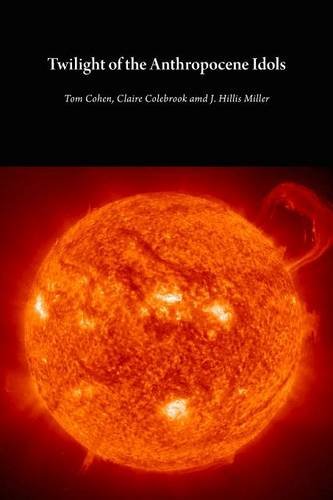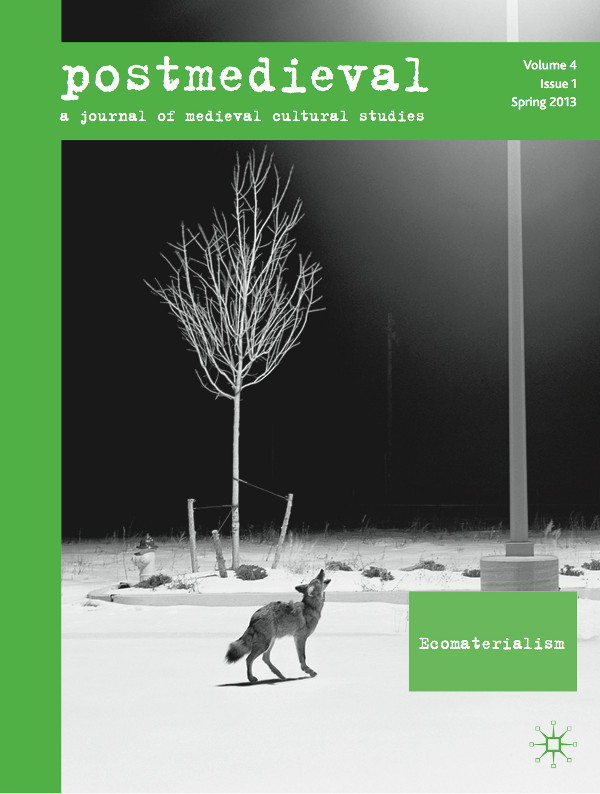Tom Cohen, Claire Colebrook, J. Hillis Miller: Twilight of the Anthropocene Idols (2016)
Filed under book | Tags: · anthropocene, climate crisis, ecocriticism, environment, human, literature, theory

“Following on from Theory and the Disappearing Future, Cohen, Colebrook and Miller turn their attention to the eco-critical and environmental humanities’ newest and most fashionable of concepts, the Anthropocene. The question that has escaped focus, as “tipping points” are acknowledged as passed, is how language, mnemo-technologies, and the epistemology of tropes appear to guide the accelerating ecocide, and how that implies a mutation within reading itself—from the era of extinction events.
Only in this moment of seeming finality, the authors argue, does there arise an opportunity to be done with mourning and begin reading. Drawing freely on Paul de Man’s theory of reading, anthropomorphism and the sublime, Twilight of the Anthropocene Idols argues for a mode of critical activism liberated from all-too-human joys and anxieties regarding the future. It was quite a few decades ago (1983) that Jurgen Habermas declared that ‘master thinkers had fallen on hard times.’ His pronouncement of hard times was premature. For master thinkers it is the best of times. Not only is the world, supposedly, falling into a complete absence of care, thought and frugality, a few hyper-masters have emerged to tell us that these hard times should be the best of times. It is precisely because we face the end that we should embrace our power to geo-engineer, stage the revolution, return to profound thinking, reinvent the subject, and recognize ourselves fully as one global humanity. Enter anthropos.”
Publisher Open Humanities Press, 2016
Critical Climate Change series
Creative Commons BY-SA 4.0 License
ISBN 9781785420153 (Print), 9781785420160 (PDF)
220 pages
PDF, PDF, PDF (3 MB, updated on 2016-7-19)
Comment (0)Postmedieval, a Journal of Medieval Cultural Studies, Vol 4, No 1: Ecomaterialism (2013)
Filed under journal | Tags: · actor-network theory, ecocriticism, ecomaterialism, environment, landscape, materiality, medieval studies, middle ages, nature

postmedieval is a cross-disciplinary, peer-reviewed journal in medieval studies that aims to bring the medieval and modern into productive critical relation.
“The latest issue of postmedieval takes up Jane Bennett’s challenge in the last chapter of her book Vibrant Matter: A Political Ecology of Things to rethink environment and landscape from an actor-network point of view. Focusing upon the meeting of ecocriticisim with other modes of theoretical and critical inquiry, ecomaterialism creates a forum where the materiality of the world obtains the complicated agency and lack of catastrophe that environmental criticism too often does not grant. We focus upon the living elements earth, air, water, fire, and their medial instantiations: cloud, road, glacier, abyss. Rather than a traditional ecocritical mode that traces the interface of human with landscape, we are interested in reconceiving ecomaterial spaces and objects as a web of co-constituitive and hybrid actants.”
Edited by Jeffrey Cohen and Lowell Duckert
Publisher Macmillan, 2013
ISSN 2040-5960
123 pages
PDF (single PDF)
View online (PDF and HTML articles)
Timothy Morton: The Ecological Thought (2010)
Filed under book | Tags: · dark ecology, ecocriticism, ecology, environment, global warming, nature, object, philosophy, posthumanism, romanticism

“In this book, Timothy Morton argues that all forms of life are connected in a vast, entangling mesh. This interconnectedness penetrates all dimensions of life. No being, construct, or object can exist independently from the ecological entanglement, Morton contends, nor does “Nature” exist as an entity separate from the uglier or more synthetic elements of life. Realizing this interconnectedness is what Morton calls the ecological thought.
In three chapters, Morton investigates the philosophical, political, and aesthetic implications of the fact that all life forms are interconnected. As a work of environmental philosophy and theory, The Ecological Thought explores an awareness of ecological reality in an age of global warming. Using Darwin and contemporary discoveries in life sciences as root texts, Morton describes a mesh of interconnected life forms—intimate, strange, and lacking fixed identity.”
Publisher Harvard University Press, 2010
ISBN 0674049209, 9780674049208
178 pages
Reviews: Gratton (Speculations, response), Coupe (Times Higher Education, response by Bryant), Hengstebeck (specs, 2011), Holmes (Journal of Ecocriticism, 2012), Watson (Interstitial, 2013), Muecke (Los Angeles Review of Books, 2014).
PDF (updated on 2012-10-31)
Comment (0)
